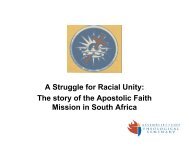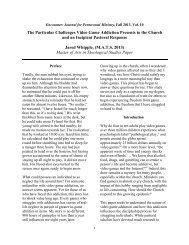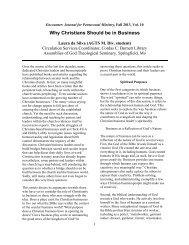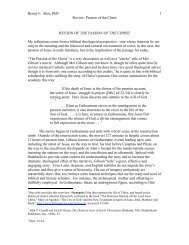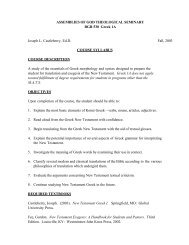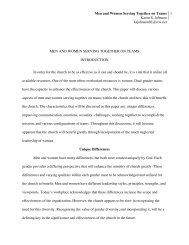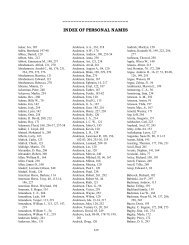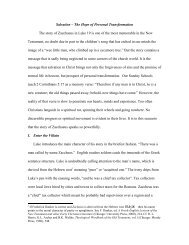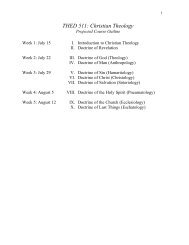Encounter: Journal for Pentecostal Ministry - Assemblies of God ...
Encounter: Journal for Pentecostal Ministry - Assemblies of God ...
Encounter: Journal for Pentecostal Ministry - Assemblies of God ...
You also want an ePaper? Increase the reach of your titles
YUMPU automatically turns print PDFs into web optimized ePapers that Google loves.
<strong>God</strong> is indeed “already, but not yet.” Ronald<br />
J. Sider contends that, “far too <strong>of</strong>ten we miss<br />
the pr<strong>of</strong>ound political implications <strong>of</strong> Jesus‟<br />
proclamation <strong>of</strong> the kingdom <strong>of</strong> <strong>God</strong> and the<br />
resurrection‟s confirmation that Jesus was<br />
indeed the Messiah who had ushered in that<br />
long-expected kingdom.” 8 A <strong>Pentecostal</strong><br />
approach would undoubtedly see the impact<br />
<strong>of</strong> Jesus‟ ministry as bringing personal<br />
salvation, but it cannot stop there; rather, a<br />
more holistic view <strong>of</strong> redemption needs to be<br />
adopted. That is, while salvation involves<br />
eternal security, it also involves redemption<br />
<strong>of</strong> the whole person, in this life, now. Jesus‟<br />
collision with the temporal world also brings<br />
about an opportunity <strong>for</strong> the believer to work<br />
through political structures in a beneficial<br />
way <strong>for</strong> both the community <strong>of</strong> believers and<br />
nonbelievers. 9<br />
Beyond covering some <strong>of</strong> the basic reasons<br />
<strong>for</strong> a necessity <strong>of</strong> a <strong>Pentecostal</strong> political<br />
theology, and be<strong>for</strong>e <strong>of</strong>fering some<br />
proposals, a further assessment <strong>of</strong> the current<br />
Christian political scene is in order. First,<br />
Nicholas Wolterstorff, in the <strong>for</strong>eword to the<br />
groundbreaking compilation <strong>of</strong> essays,<br />
Evangelicals and Empire, notes that since<br />
Hegel, “domination and liberation have been<br />
the fundamental categories <strong>of</strong> social analysis<br />
and critique [because theoretically out <strong>of</strong> the<br />
two opposing <strong>for</strong>ces will come the synthesis].<br />
An authentically evangelical voice in the<br />
discussion will question this and propose<br />
instead that justice and injustice be the<br />
fundamental categories.” 10 These categories<br />
will be adopted in this essay since the<br />
domination/liberation model is flawed on<br />
account <strong>of</strong> exceedingly broad definitions that<br />
condone movement toward tyrannical<br />
oligarchy with little oversight. 11<br />
This is witnessed by the burgeoning analysis<br />
<strong>of</strong> American empire and evangelicalism‟s<br />
role in that empire. As Benson and Heltzel<br />
state, “Inasmuch as some evangelicals work<br />
together with movements in the Religious<br />
Right that are perpetuating the dark side <strong>of</strong><br />
empire—including U.S. practices <strong>of</strong> war and<br />
torture, 12 neoliberal economic policy, and<br />
unilateral, isolationist <strong>for</strong>eign policy—they<br />
continue to participate in empire.” 13 Further,<br />
global market fundamentalism, as Yong and<br />
Zalanga call it, has become a hegemonic<br />
<strong>for</strong>ce taking on the status <strong>of</strong> a religion itself,<br />
and the rationality underpinning such<br />
unbridled capitalism has invaded the Church<br />
<strong>of</strong> Christ in the way they compete <strong>for</strong> market<br />
shares (converts) by developing a product<br />
with either mass consumer appeal or<br />
specialization <strong>for</strong> a specific corner <strong>of</strong> the<br />
market. 14 The question then is: Will<br />
<strong>Pentecostal</strong>ism be a medium <strong>for</strong> the <strong>for</strong>ces <strong>of</strong><br />
biopower (“a subtle <strong>for</strong>m <strong>of</strong> manipulation<br />
that infects our brains and makes us<br />
internalize the values <strong>of</strong> capitalism” 15 ), or<br />
will it be a subversive movement<br />
championing the struggle <strong>for</strong> justice against<br />
the hegemony <strong>of</strong> empire? 16 If a movement<br />
exists within Christianity that could<br />
withstand the lure <strong>of</strong> American civil religion<br />
and the global market fundamentalism tied to<br />
it, <strong>Pentecostal</strong>s and Charismatics could be the<br />
ones capable <strong>of</strong> hurdling such a daunting<br />
obstacle. 17 What is missing, however, is a<br />
proper understanding <strong>of</strong> how to communicate<br />
our ideals in the political sphere, what our<br />
Christian faith means <strong>for</strong> our political<br />
involvement, and what it truly means to be a<br />
citizen.<br />
First, one firmly entrenched perspective that<br />
needs eradicating revolves around the<br />
widespread belief that America is a Christian<br />
nation that needs “taken back <strong>for</strong> <strong>God</strong>.” 18 As<br />
Black notes, the United States has always<br />
been a pluralistic nation; from the Articles <strong>of</strong><br />
Confederation through the ratifying <strong>of</strong> the<br />
Constitution, the freedom <strong>of</strong> religion has<br />
been a foundational principle <strong>of</strong> our<br />
democracy. 19 Thus, the claim that<br />
Christianity holds the right to dictate policy



